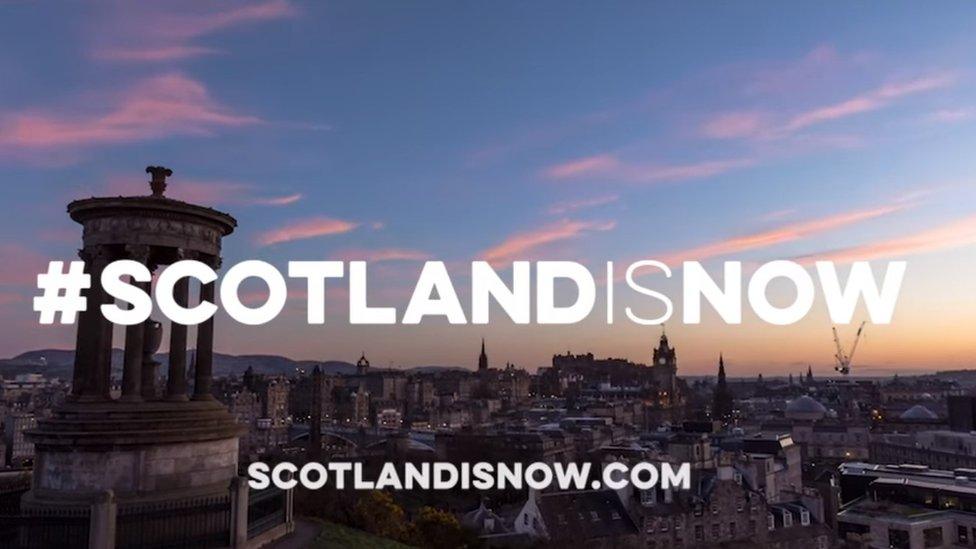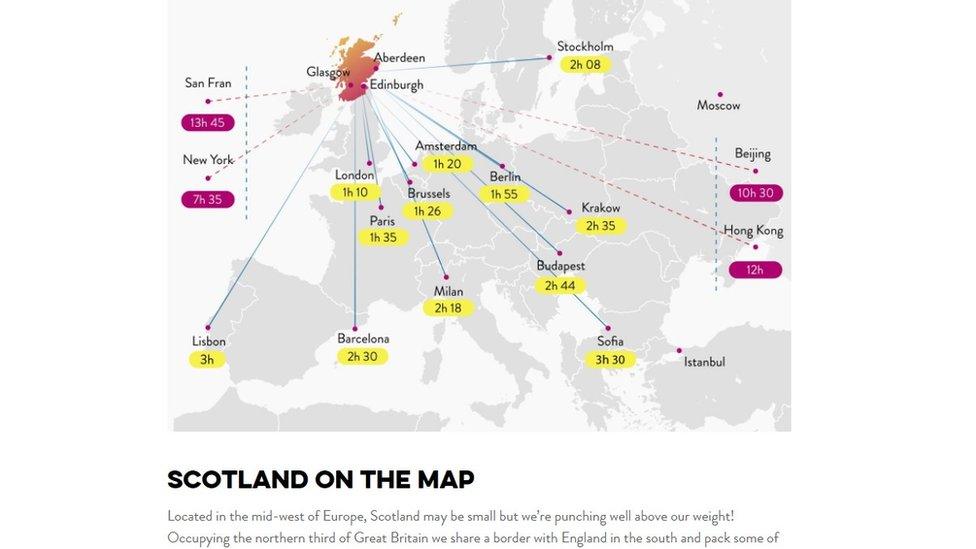A Brief History of Now
- Published

It was 1984, and US President Ronald Reagan was coasting to re-election. His campaign slogan: "The Time Is Now".
What did that mean? By no accident, it meant nothing at all. It didn't need to. The best that can be said is that it indicated a sort of "action this day" immediacy. A candidate who would get things done.
Thirty-four years later, I found myself quizzing the Cabinet Secretary for Culture, Media and External Affairs, Fiona Hyslop MSP, about the new slogan: "Scotland is Now".
What does that mean? It means "bold, optimistic, progressive," she told me. And in the one-minute film to accompany the launch, it means lots of other things besides.
A view of Eigg. A sea kayak. Andy Murray (though that was Then). Happy young people. A mountain biker. A baby box. Skyscanner. A gay wedding. A telephone. Dolly the Sheep. The Royal Mile during the Fringe. Dundee's V&A. A happy female black graduate. A wind turbine (in windless weather). And so it goes on. As with the return of the Generation Game, there could be a prize for remembering the most images as they rattle through a minute of video.
The poetry is there to inspire: "Now is a place where hope calls home. Now is compassion and freedom to roam. Now builds bridges. Now breaks down walls. Now is new thinking. Now gives its all."
Outward
So in this context, what does "now" mean? Or to be less obtuse, what's this all about?
Park, if you will, the cynical inkling that this might have something to do with the political objectives of SNP ministers.
The intention is to use this for an outward focus. The context is sluggish economic growth, and far too few Scottish companies exporting. Something has to happen to spark some life back into economic activity. And amid government squeeze and consumer credit overhang, exports and inward investment seem the best place to look.
The appeal is to potential tourists, to students and to people who might be persuaded to move to Scotland, to live and work. The demographic context is also part of this.
So it seeks to be all encompassing, for all external promotion of Scotland, and probably a lot of internal messaging too.
Not trendy
Market surveying in the US and London found Scotland scored high on history, landscapes and culture. It scored pretty badly on innovation, "being trendy" and "forward-looking".
So no surprise that this seeks to take the strengths, and leverage a change of perception about the weaknesses. "A new way of looking at Scotland," is the sub-heading. No longer about "then".
Castles, clans, tartans and scenery are still highly effective in tourism, and they're not being jettisoned. Rival destinations would love to have Scotland's high recognition factor.
But these count a lot less so for inward investment and export promotion, and with tourism currently doing well, it's those trade links that need the jolt.

The campaign's website has information about Scotland's place in the world
It's been tried before. The tourist agency has always had a slogan or a campaign on the go. "Scot Spirit" has been the most recent, for the past two years drawing together a handy hashtag with the warmth of the welcome and the distilled variety that is Scotland's best recognised product.
So what marks this out as different from, say, Labour First Minister Jack McConnell's foray into ad copyrighting with the unforgettable "best small country in the world"?
Co-ordination. This is a joint effort across Scottish government and its agencies. For the first time, it's claimed, there's a single message coming from government, VisitScotland, Scottish Enterprise and the inward investment and export promotion agency.
Add to that Scottish universities. And business has also been signed up to make use of the branding. Scotch whisky was quick to join in, as it seeks to make peace with Scottish ministers, following the legal battle over minimum unit pricing. Scottish finance is one of those soon to follow.
Authentic
I ran the film past Alan Wilson, professor of marketing at Strathclyde University's Business School.
His perception was that it had too many visual messages, some subliminal for those who know their history of Scottish inventions, but which will leave most foreigners confused.
The immediacy of the "now" message works for a tourism sell. In marketing, there is the drive to get people to a decision. Not to put a golfing vacation in Scotland on the bucket list, but to do it this year.
It is less obvious how it works for a company considering inward investment. The pipeline of such projects moves exceedingly slowly. Pressure selling doesn't count for much.
The key to a successful national branding campaign, argued Prof Wilson, is the ability to back it up with the reality. To be authentic.
So there's the challenge. If Scotland is to sell itself as "bold, optimistic and progressive", if its businesses are to be outward-looking and looking for global markets, then Scots will have to live up to it. Now!